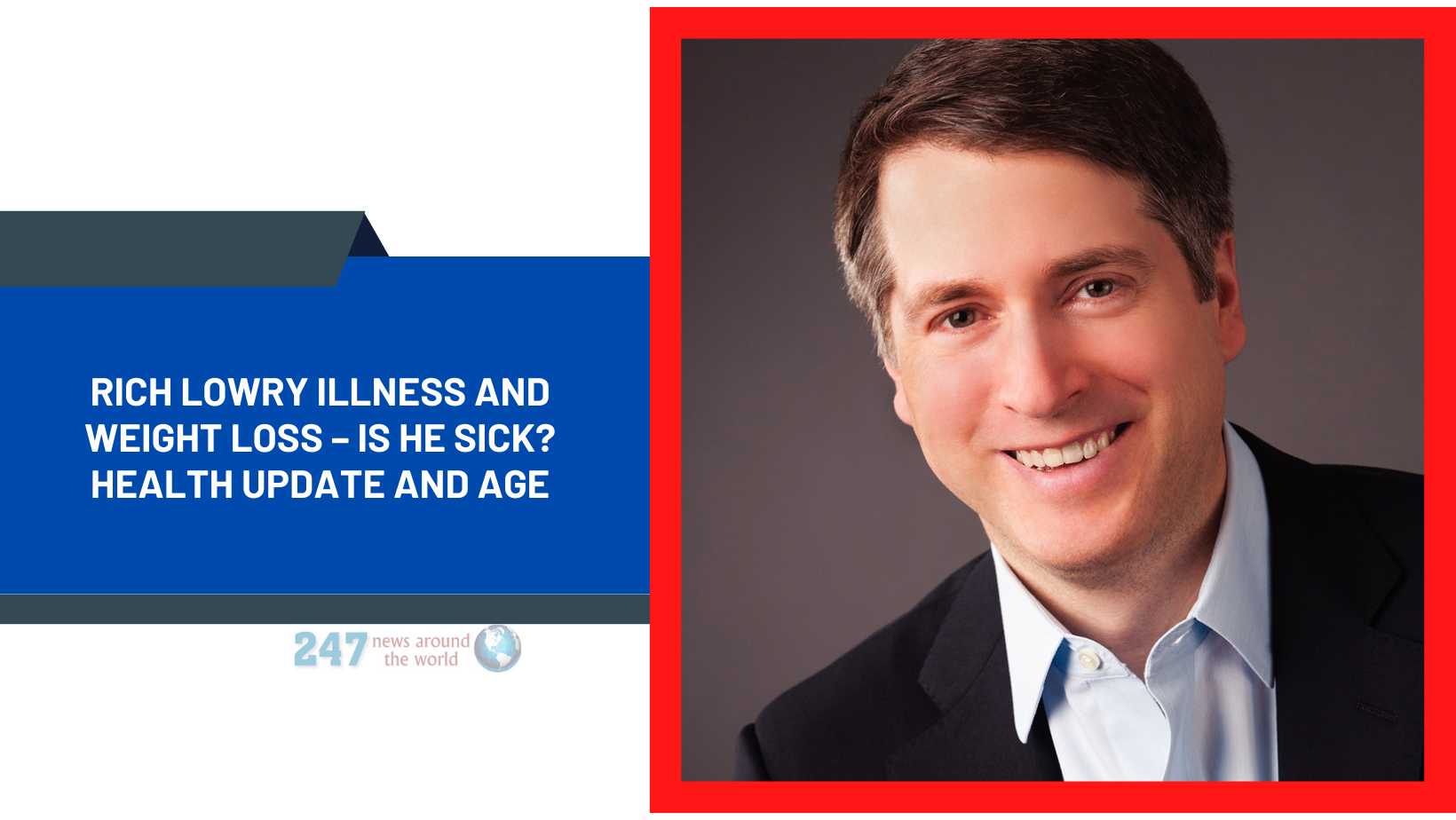When it comes to influential voices in American politics, Rich Lowry stands out as a prominent figure. As the editor of National Review, his work has shaped conservative discourse for decades. But lately, whispers about Rich Lowry's illness have been circulating, sparking curiosity and concern among his followers. In this article, we'll dive deep into the details surrounding his health journey, separating fact from fiction, and providing you with the most accurate information available.
Rich Lowry isn't just another name in the political arena; he's a thought leader whose contributions have left a lasting impact. So, when news of his health issues surfaced, it naturally drew attention. But before we jump into the specifics, let's set the stage by understanding why Rich Lowry matters and why his well-being is a topic of interest.
Health challenges faced by public figures often serve as a reminder of our shared humanity. In Rich Lowry's case, his illness has become a conversation starter, not just about his personal journey, but also about the broader implications of health awareness in high-stress professions. Let's explore this further, shall we?
Read also:Rebekah Howard Net Worth The Rising Stars Journey To Success
Who Is Rich Lowry?
Before we delve into Rich Lowry's illness, it's essential to understand who he is. Rich Lowry, born on January 25, 1968, in Chicago, Illinois, is an American political commentator, author, and editor. He rose to prominence as the editor of National Review, one of the leading conservative publications in the United States. His career has been marked by a commitment to conservative principles and a knack for engaging in thought-provoking debates.
Rich Lowry's influence extends beyond his editorial role. He's a regular guest on political talk shows, where he offers insightful commentary on current events. His ability to articulate complex ideas in a relatable manner has earned him a dedicated following. But like anyone else, Rich Lowry is not immune to life's challenges, including health-related issues.
Rich Lowry's Professional Journey
Rich Lowry's career journey is nothing short of inspiring. After graduating from Columbia University, he embarked on a path that would eventually lead him to the helm of National Review. Under his leadership, the publication has continued to thrive, offering a platform for conservative voices to be heard.
His work has not gone unnoticed. Rich Lowry has authored several best-selling books, including "Legacy: A Genetic History of the Jewish People" and "Imbeciles: The Supreme Court, American Eugenics, and the Sterilization of Carrie Buck." These works showcase his intellectual depth and dedication to exploring important societal issues.
Rich Lowry's Illness: The Facts
Now, let's address the elephant in the room – Rich Lowry's illness. Reports suggest that Rich Lowry has been dealing with health challenges that have affected his ability to engage fully in his professional commitments. While specifics are often kept private, it's crucial to approach this topic with sensitivity and respect for his privacy.
The illness in question is believed to be related to stress and the demands of his high-profile career. Chronic stress can take a toll on anyone, even those who seem invincible. It's a reminder that even the most accomplished individuals are not exempt from the challenges of modern life.
Read also:Unveiling The Mystique Of Mitzi Russell A Journey Through Fame And Legacy
Symptoms and Diagnosis
While exact details about Rich Lowry's condition remain undisclosed, reports indicate that he has experienced symptoms commonly associated with stress-related illnesses. These may include fatigue, anxiety, and difficulty concentrating. Diagnosing such conditions often involves a comprehensive evaluation by healthcare professionals, who consider both physical and mental health factors.
It's important to note that stress-related illnesses can manifest in various ways. What works for one person might not work for another, making personalized treatment plans essential. Rich Lowry's journey highlights the importance of seeking professional help when facing health challenges.
The Impact of Stress on Public Figures
Public figures like Rich Lowry often face unique pressures that can contribute to stress-related illnesses. The constant scrutiny, long hours, and high expectations can create an environment where stress becomes a regular companion. Understanding the impact of stress on individuals in these roles is crucial for promoting better health awareness.
Stress can affect anyone, regardless of their position or achievements. For public figures, the stakes are often higher, as their well-being can influence public perception and the success of their endeavors. Recognizing the signs of stress and taking proactive steps to manage it is essential for maintaining both personal and professional health.
Signs of Stress in High-Stress Professions
Identifying stress in high-stress professions can be challenging, but certain signs are often present. These may include:
- Increased irritability and mood swings
- Difficulty sleeping or insomnia
- Changes in appetite or weight
- Decreased motivation or productivity
- Physical symptoms like headaches or muscle tension
Recognizing these signs early can make a significant difference in managing stress effectively. For individuals in leadership roles, prioritizing mental and physical health is not just beneficial for themselves but also for those they lead.
Rich Lowry's Approach to Managing Illness
Rich Lowry's approach to managing his illness serves as an example of resilience and determination. While specifics of his treatment plan remain private, it's clear that he has taken steps to address his health challenges head-on. This includes seeking professional medical advice, making lifestyle adjustments, and prioritizing self-care.
Self-care is not a one-size-fits-all solution. For some, it may involve incorporating mindfulness practices like meditation or yoga. For others, it could mean setting boundaries to reduce stressors. Rich Lowry's journey highlights the importance of finding what works best for each individual.
Lessons from Rich Lowry's Experience
Rich Lowry's experience offers valuable lessons for anyone facing similar challenges. First and foremost, it underscores the importance of recognizing the signs of stress and seeking help when needed. It also highlights the value of building a support system, whether through family, friends, or professional networks.
Additionally, Rich Lowry's journey reminds us that taking time to focus on our health is not a sign of weakness but a necessity. In a world where productivity is often prioritized over well-being, his story serves as a powerful reminder of the importance of balance.
Health Awareness in the Workplace
Rich Lowry's illness also brings attention to the broader issue of health awareness in the workplace. Employers have a responsibility to create environments that promote well-being and reduce stress. This can be achieved through initiatives like flexible work arrangements, mental health support, and wellness programs.
Employees, too, play a role in maintaining their health. By prioritizing self-care and advocating for healthier work environments, individuals can contribute to a culture of well-being that benefits everyone. Rich Lowry's experience serves as a call to action for both employers and employees to take health seriously.
Steps Employers Can Take
Employers can take several steps to promote health awareness in the workplace. These include:
- Offering mental health resources and support
- Encouraging open conversations about stress and well-being
- Implementing flexible work policies to reduce burnout
- Providing access to wellness programs and activities
By creating a supportive environment, employers can help employees manage stress effectively and thrive both personally and professionally.
The Role of Public Awareness
Public awareness plays a crucial role in addressing health challenges faced by individuals like Rich Lowry. By sharing stories and experiences, we can reduce stigma and encourage others to seek help when needed. It's important to approach these topics with empathy and understanding, recognizing that everyone's journey is unique.
Media coverage of health issues faced by public figures can also contribute to greater awareness. When done responsibly, it can educate the public about the importance of prioritizing health and well-being. Rich Lowry's illness has sparked conversations that extend beyond his personal journey, highlighting the need for broader societal change.
Promoting Health Education
Promoting health education is key to addressing stress-related illnesses. This involves providing resources and information to help individuals recognize the signs of stress and take proactive steps to manage it. Education can empower people to make informed decisions about their health and well-being.
Community programs, workshops, and online resources can all contribute to greater health awareness. By investing in education, we can create a society that values health as a fundamental aspect of success and happiness.
Conclusion: Moving Forward with Health in Mind
In conclusion, Rich Lowry's illness serves as a powerful reminder of the importance of prioritizing health, especially in high-stress professions. While his journey may be unique, the lessons it offers are universal. Recognizing the signs of stress, seeking help when needed, and promoting health awareness in the workplace are all steps we can take to create a healthier, more balanced society.
We invite you to join the conversation by sharing your thoughts and experiences in the comments below. Together, we can continue to raise awareness and promote well-being for all. And don't forget to explore other articles on our site for more insights into health, wellness, and personal growth.
Table of Contents
- Rich Lowry's Illness: A Closer Look at the Health Challenges Faced by the Renowned Editor
- Who Is Rich Lowry?
- Rich Lowry's Professional Journey
- Rich Lowry's Illness: The Facts
- Symptoms and Diagnosis
- The Impact of Stress on Public Figures
- Signs of Stress in High-Stress Professions
- Rich Lowry's Approach to Managing Illness
- Lessons from Rich Lowry's Experience
- Health Awareness in the Workplace
- Steps Employers Can Take
- The Role of Public Awareness
- Promoting Health Education
- Conclusion: Moving Forward with Health in Mind



